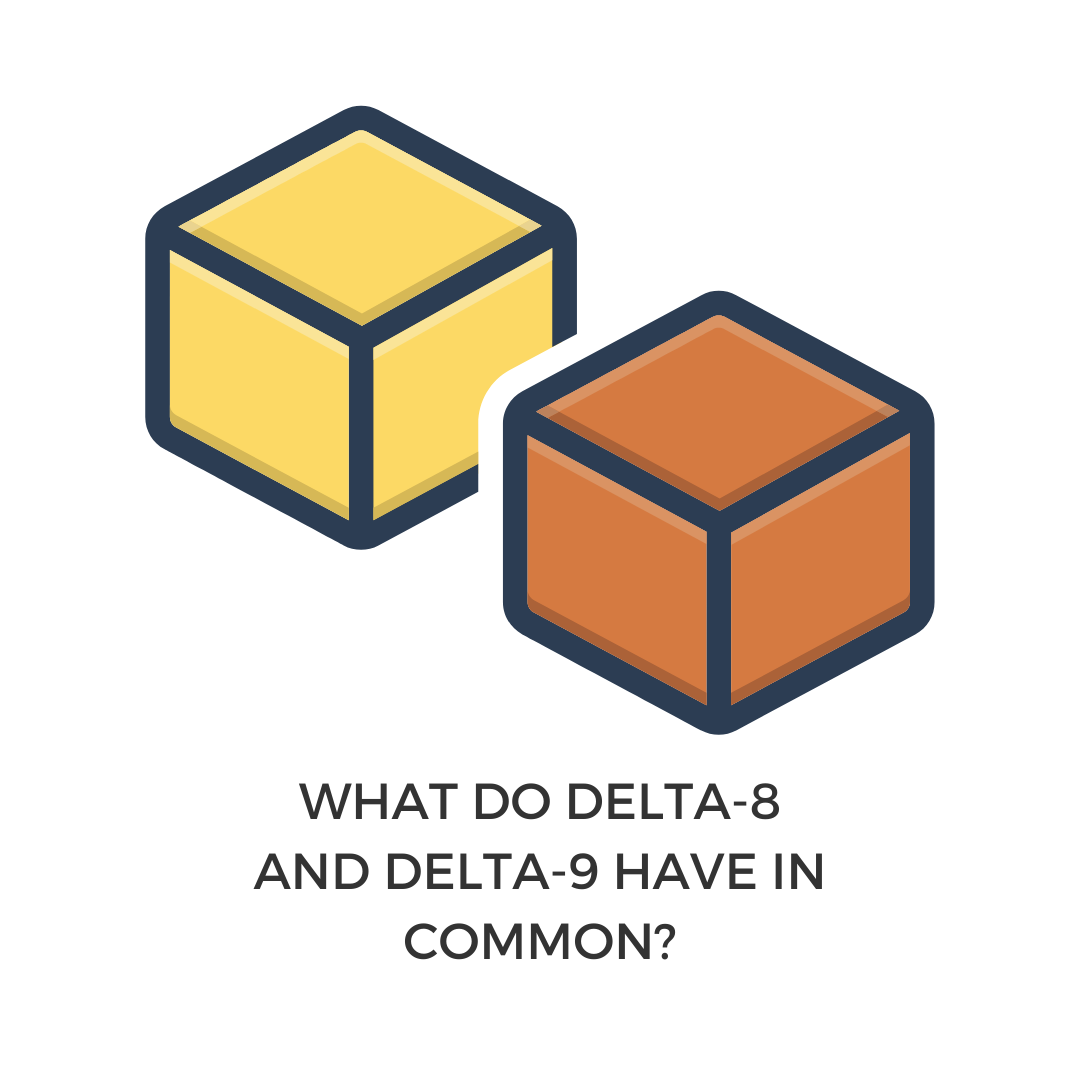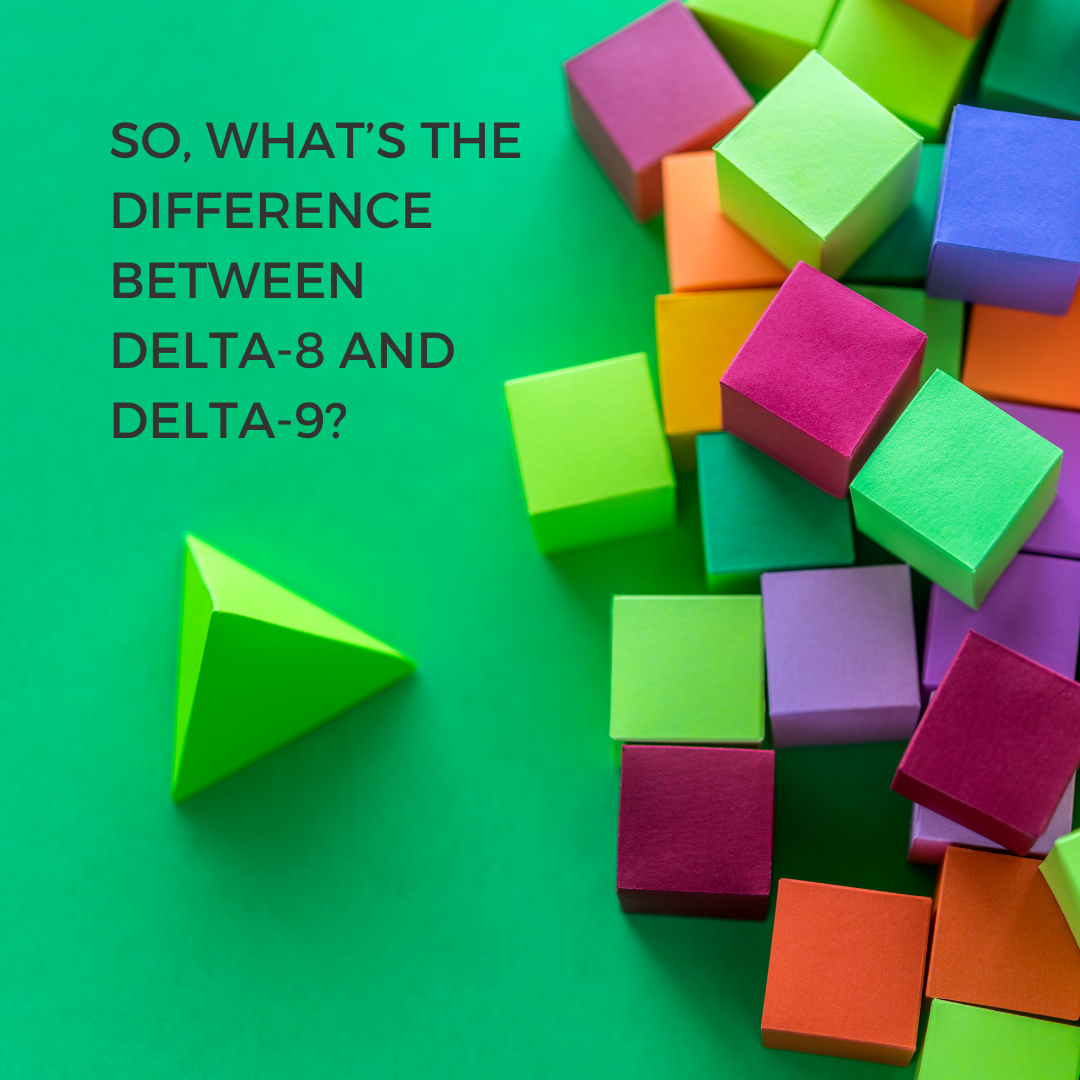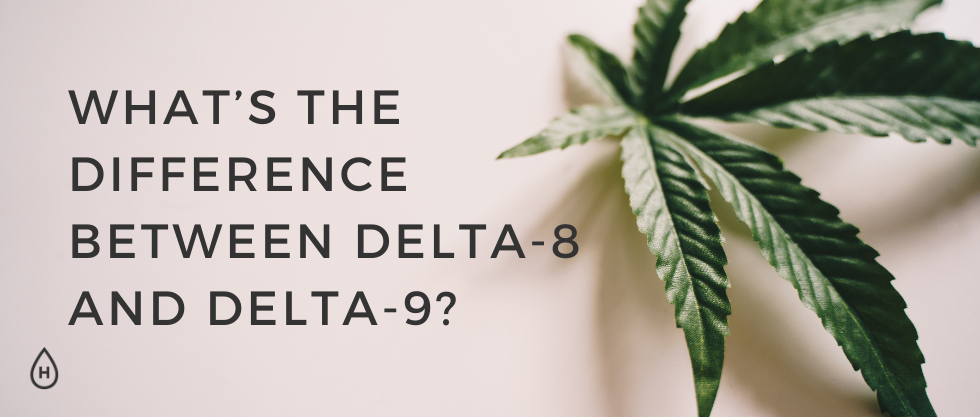Delta-8 and delta-9 are both THC — so how is one legal federally while one is only legal in some states? Delta-9 THC is still a controlled substance, but delta-8 as a hemp derivative is legal in most areas nationwide. But what’s the difference between delta-8 and delta-9?
Confusion around compound variants is normal and understandable, and we want to set the record straight. Our goal is transparency, especially since we sell delta-8 products ourselves. You deserve to fully understand the differences between delta-8 THC and delta-9 THC.
What’s the Difference Between Delta-8 and Delta-9?
Before going over the ways that they differ, it’s also important to understand how they are similar. Since they’re both forms of THC, they have a similar impact on the natural endocannabinoid system.
However, these similarities don’t mean the experience is exactly the same. On the contrary, the intensity of the impact (AKA the high) can be extremely different for delta-8 and delta-9. Let’s dive into the fundamentals of these two variants before getting into the differences between Delta-8 and Delta-9.
 What Do Delta-8 and Delta-9 Have in Common?
What Do Delta-8 and Delta-9 Have in Common?
Delta-8 and delta-9 THC are both naturally found in cannabis, although delta-9 is found in much higher abundance. In fact, delta-9 is usually the default compound used when referencing THC by the general public.
But with over 100 compounds found in cannabis, this isn’t the case at all. Delta-9 quantity in a cannabis plant simply classifies whether it’s hemp or marijuana. If it’s hemp, it contains 0.3% delta-9 THC or less. A higher quantity may be regarded as marijuana instead.
Both forms of THC possess similar quantities in many ways. For example, they’re both psychoactive compounds. Therefore, they each have the ability to intoxicate. They also share an incredibly similar molecular composition. The only difference is a single carbon chain.
Delta-8 and delta-9 have also both been shown to help stimulate appetite. Depending on the time of day you take delta-8, it may help stimulate focus or may help with sleep. Conversely, depending on the strain the delta-9 is in, it can help you focus or help with sleep.
The list of exact similarities between the two cannabinoids is fairly short, though. Even so similar on a molecular level, they’re wildly different and distinct molecules. It’s much like how carbon dioxide and carbon monoxide are only one atom apart. Vastly different elements, it’s incredible to see what it takes to make such parallels.
This is why it’s also important to understand delta-8 products fully if you’re thinking of trying one out.
So, What’s the Difference Between Delta-8 and Delta-9?
Now we can get into the meat of the question. What’s the big difference between delta-8 and delta-9? Both forms of THC interact with the same parts of the brain, but the overall response is less similar. Let’s get into a few of the key differences to understand why people are eager to try delta-8.
Molecular structures are (slightly) different
Delta-8 THC has the same chemical formula as delta-9, but the structure that makes it up is slightly different.
This means that delta-8 is an isomer of delta-9 — same formula, different arrangement of atoms. And you might be thinking, this difference shouldn’t change much. But even minuscule changes in compounds can lead to unique differences. Again, carbon dioxide and carbon monoxide are only different by one atom.
When observed closely the compounds have a difference in carbon atom double bonds. This single, itty bitty change drastically alters how the brain processes the compounds.
The names delta-8 and delta-9 are actually completely based on this small difference. The double bond of the carbon atom of delta-9 is on the 9th chain of its molecular structure. Following this naming system, delta-8’s double bond is present on the 8th chain.
How they become user ready
As the most abundant cannabinoid in marijuana, Delta-9 THC is considered a major cannabinoid. Conversely, CBD is considered the major cannabinoid for some hemp plants. Each of the cannabinoids’ quantities by volume surpasses most other compounds in the cannabinoid family.
Once a marijuana plant is harvested and cured, the buds are ready for consumption. Delta-9 is readily available in this way.
Delta-8 THC is also present in these buds naturally, although it’s much lower in quantity. Such a low percentage in concentration earns delta-8 the title of minor cannabinoid.
This makes natural extraction much more resource-costly and time-consuming. Delta-8 producers turn to faster, man-made means of extracting the compound. Solvents that can keep the process clean are the fastest but safest way to extract the minor cannabinoid.
The process pulls away any undesired cannabinoids through filtration. Then, after a distillation step, delta-8 is all that remains, and in its purest form.
While the process for getting delta-8 products might be more time-consuming, many users find it worth it. That leads us to our next point.
Intensity of effect
This is possibly the biggest, most notable difference between delta-8 and delta-9. So far, we’ve learned that delta-9 is the THC responsible for the high from marijuana.
We also learned that delta-8, as a THC, also has intoxicating effects. However, the types of high are not the same.
Delta-9 THC is famous for how quickly and powerfully it affects the endocannabinoid system. After smoking, marijuana users can feel the effects usually within minutes or even seconds. This can be absolutely overwhelming for someone new to cannabis. But the heavy-hitting, rapid onset is what a vast majority of its fans are seeking in the first place.
The effects are actually so sudden, they can cause anxiety and paranoia in some cases. This can be heightened when coupled with the occasional audio-visual impact and delusions that accompany some sessions.
Other times the effects could impact a user’s motor skills and leave them feeling impaired or extremely heavy. This is usually accompanied by a “brain fog” effect which can make thinking difficult.
Why Users Prefer Delta-8
Delta-8 causes a high, but with far less intensity. It also is not instantaneous like its cousin compound. The high associated with delta-8 is more of a creeping sensation that smooths out into a much more pleasant experience.
The delta-8 high may promote relaxation, clearer thinking, an improved outlook on life, and feelings of ease and contentment. Most users report that delta-8 helps them keep a calm attitude and state of mind. This is coupled with reports that it doesn’t impair you mentally or physically. Instead, it allows you to go about your normal day.
A lot of early adopters of delta-8 make the switch simply to keep stressful days more manageable. They’re in control while still keeping a positive, heightened mood. This is a stark contrast to the intense, couch-locking high delta-9 might provide.
What’s the Difference Between Delta-8 and Delta-9 Legally?
Although state-by-state law varies, with some even already banning the use of delta-8, as of right now delta-8 is legal on the federal level. This is because delta-8 is a product made using industrial, legal hemp. Federally illegal delta-9 is present in trace amounts of the plant, only up to 0.3%.
This is thanks to the 2018 Farm Bill. Part of the bill, the Hemp Act, federally legalized hemp and all its derivatives. Since delta-8 is a compound found in hemp, it falls into the gray area of the Farm Bill’s protection.
The laws at the individual state level still vary. You should still make sure it’s legal in your area to buy delta-8 products before giving it a try.
 Wrapping Up
Wrapping Up
While information surrounding delta-8 is plentiful, it isn’t always clear. It’s a hot-button topic as laws around delta-8 products teeter back and forth without really landing anywhere definitive. The FDA doesn’t currently involve itself with delta-8 regulation. Therefore, claims about its uses and abilities can potentially be exaggerated, or even vague. There are some things that are certain, though.
We know it’s naturally occurring. It’s found right alongside the other 100+ cannabinoids in cannabis. We know that it’s milder than delta-9 THC. Finally, we know that it impacts things like mood, hunger, and rest.
While they are certainly similar in intended purpose, the experience and amount needed can differ greatly.
The difference between delta-8 and delta-9 is that delta-8 lets you ease into trying cannabis. You don’t have to worry about the rollercoaster of intensity a lot of people experience with delta-9 THC. If you’re especially new to the world of cannabis, delta-8 provides the perfect introduction.
Ultimately, it boils down to what you are looking for when you have these options available. Delta-9 is known for its intensity and delta-8 sports a much gentler slope of effect. You have plenty of information now to decide which could be right for you and your own personal experience!
